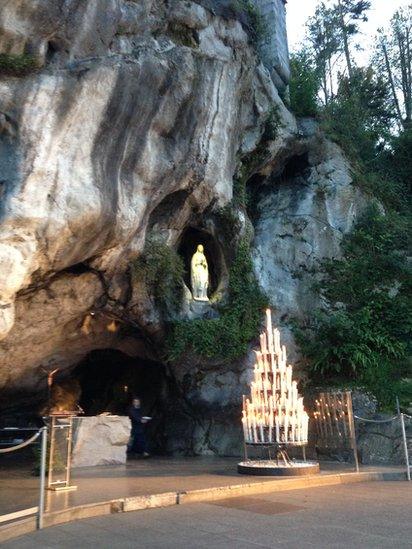Dr Michael Moran evaluates Lourdes miracles reports
- Published

When Belfast doctor Michael Moran began volunteering in Lourdes 17 years ago, he had no idea that he would end up becoming part of a small, select team that evaluates miracles at the Catholic religious shrine in France.
The small market town lies in the foothills of the Pyrenees, and is famous for the Marian apparitions of Our Lady of Lourdes that are reported to have occurred in 1858 to Bernadette Soubirous.
The trainee ENT surgeon is the first doctor from Ireland to take a place on the panel.
Dr Moran said his appointment came "very much by surprise".
"I'd been volunteering in Lourdes for years and had the normal contact that any doctor would have with the medical bureau there," he said.
"Around about November 2012, I started to get a few emails which suggested that something might happen soon and it was actually in 2013 that I was proposed and confirmed as a member."
The panel is made up of about 40 people from around the world who come from different medical specialties, backgrounds and levels of training.
Their role is to decide whether or not cures that people claim to have had at Lourdes are explicable medically.
"It's very much a scientific committee so we are not the people who can say the word miracle - that's something for the church to comment on," Dr Moran said.
'Evidence'
"I think the important thing is that members of the committee have to set whatever their beliefs are aside, be they pro or con Lourdes as a place to go, a place of miracles and a place of healing.
"The committee is really convened as a group of professional people who sit with the best medical evidence and can even request more medical evidence to substantiate what has been claimed by the person."
A number of cases are currently under assessment.
The committee meets annually, but a decision can take many years to reach.
"Because of the need for a length of time for the cure to fulfil the criteria that are quite strictly set by the church, we would discuss cases year-to-year that don't really change very much and we're just really waiting for a certain timeframe to be passed for us to comment further or request further examination or tests," he said.
Since 1858, there have been 69 verified miracles or cures in Lourdes.
"Those are the ones that we have absolutely certain medical evidence and we can stand over," Dr Moran said.
'Something different'
"The most recent one was a lady with extremely high blood pressure who had a benign tumour on her adrenal gland that was secreting adrenaline and keeping her blood pressure very high and she felt suddenly well.
"That's a characteristic, that you suddenly feel something different has happened, she felt it when she was in the bath in Lourdes and that was in the 1980s and that was only just confirmed in 2011."
He said the first cure was of a paralysed arm that regained function suddenly.
"Another classic example of that is a gentleman from Italy who had a tumour of the pelvis and although you can see the destruction of the pelvic bone on x-rays which are available for the public to view in Lourdes, the bone actually re-grew, both in the pelvis and the femur in an anatomically correct way that would be very hard to explain," he said.
Michael said miracles were just the "tip of the iceberg" at Lourdes.
"First of all it's a place where people can go on holiday when maybe they're terminally ill and couldn't otherwise get insurance," he said.
"There's the holiday aspect of it, but there's so much that people get from it spiritually, both as carers and as sick and disabled."
Explanation
Is there a chance that some of those who visit Lourdes come under the influence of the "placebo effect"?
"From the committee's point of view, what we're really doing is what we currently can medically explain or not explain, so there's certainly things that have happened, not in Lourdes, that we can't explain also," he said.
"Our role is really to discuss things that happened there at a specific time that people really do believe was related to their spiritual experience."
For some, the fields of science and religion do not sit easily side-by-side.
"I'm quite happy with both in the sense that I feel there's a role for both," he said.
"I know not all scientists or medics would believe that, but I certainly have seen people get a lot of great spiritual relief from Lourdes.
"I myself have also had an overwhelming experience that you can't really describe because it's such a peaceful place and it's a place where the sick are really put first and it strikes you that if Belfast hospitals and hospitals around the world were like that all the time, then the world would generally be a better place.
So what do his friends and family make of his honorary role?
"I don't generally tell people," he said.
"It's not that I'm ashamed of it or anything, it's just that it hasn't really come up in conversation because it's personally for me such an honour and such a big deal and it's not the sort of job you can apply for.
"Until now it's been kind of kept quite quiet."
- Published20 June 2013